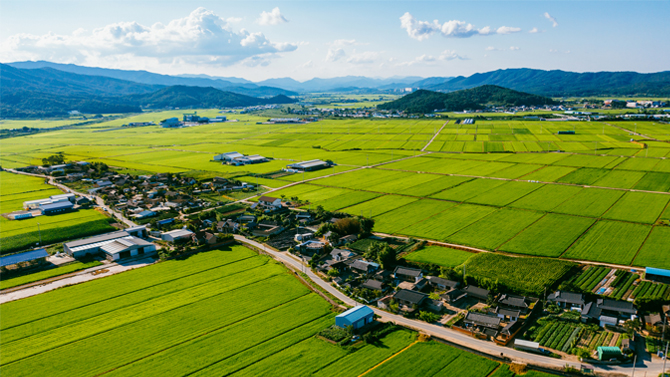Social Issues addressed by Sumitomo —Compass for the Future—
Dialogue with indigenous peoples to deepen understanding while contributing to economic and social development through mining
 Supply chain
Supply chainAmong Japanese companies, Sumitomo Metal Mining has one of the longest and most distinguished histories as heir to the Sumitomo Group’s original business of copper mining and smelting & refining. Specialized in nonferrous metals, as well as mine development and smelting & refining worldwide, the company is engaged in production and provision of battery materials and other advanced materials that are essential for economic and social development. Sumitomo Metal Mining’s business model is unique in the world, featuring collaboration among three businesses, namely, mineral resources, smelting & refining, and materials, and extending from the securing of nonferrous metal resources to provision of highly advanced materials.
In 2020 Sumitomo Metal Mining formulated the Vision for 2030 as a milestone on the path to achieving its long-term vision of “becoming the world leader in the nonferrous metals industry.” The company identified 11 material issues to be addressed in the years to 2030 and Sustainable Development Goals (SDGs) relevant to each issue. The company has defined Goal 12 “responsible consumption and production” as its foremost priority.
In order to secure minerals utilized for various indispensable purposes in society and ensure their stable supply for development of a sustainable society, mine development to extract minerals, which are natural resources upstream in the supply chain, and smelting & refining are essential activities. Cooperation and collaboration with indigenous peoples residing in the areas where the resources exist are essential, and dialogue must be cultivated based on an understanding of their history, traditions, and culture. Therefore, Sumitomo Metal Mining has set “rights of indigenous peoples” as one of its material issues and “a company that understands and respects the traditions and culture of indigenous peoples” as the vision.
The Sumitomo Metal Mining Group Policy on Human Rights, which prohibits child labor and forced labor, was amended in June 2022 to be compliant with international standards. The policy now clearly states that the Group supports the UN Guiding Principles on Business and Human Rights and promotes initiatives to respect human rights with a particular focus on the three areas of “employees”, “local residents and indigenous peoples” and “supply chain (including employees therein).” This policy positions the United Nations Declaration on the Rights of Indigenous Peoples (UNDRIP), which was adopted by the UN General Assembly in 2007, as one of international norms that the Sumitomo Metal Mining Group endorses. Referring to these international norms that uphold the rights of indigenous peoples, Sumitomo Metal Mining, in cooperation with national and local government and others, will continue dialogue based on an understanding of the traditions and cultures of indigenous peoples and carefully proceed with projects, prioritizing avoidance of any adverse impact.
Taganito HPAL Nickel Corporation (THPAL) is a Group company that started operation in the Philippines in 2013. THPAL helped with the construction of an elementary school, housing, and an assembly hall for indigenous people who have maintained their traditional lifestyles and culture. THPAL also helped open an exchange for craft items and agricultural produce and is continuing to support indigenous people in their efforts to earn a living.


Since 2017, jointly with IAMGOLD Corporation, Sumitomo Metal Mining has been promoting the Côté Gold Project in Canada. The company participated in cultural workshops hosted by two organizations of indigenous people affected by the development and has been engaged in ongoing dialogue with them. Focusing on deepening mutual understanding, the partners concluded an Impact Benefit Agreement with the organizations of the indigenous people. Based on this agreement, the project is working to create employment for the indigenous people.

In addition to all that has been done at the site for the benefit of the indigenous people, a video was created and used as an e-learning program from 2021 to deepen Group employees’ understanding of the traditions and cultures of indigenous peoples. As of the end of fiscal 2021, approximately 6,000 employees in Japan and overseas had experienced the program.

Founded in 1590 in Kyoto for copper smelting and coppersmithing, Sumitomo Metal Mining has striven to resolve social issues through its business, based on Sumitomo’s business philosophy cultivated during its history of over 430 years. The Sumitomo Metal Mining Group Corporate Philosophy emphasizes the importance of ensuring “sustainable co-existence with the global environment” and “respect for all individuals.” While promoting dialogue and deepening mutual understanding with indigenous peoples affected by mine development and other projects, Sumitomo Metal Mining aims to maximize its corporate value by securing resources and ensuring stable supply of nonferrous metals and advanced materials to help establish a sustainable society.


Read about initiatives to achieve a low-carbon society, aiming at net-zero greenhouse gas emissions since these emissions are implicated in global warming.

In view of ongoing globalization and the growing complexity of supply chains, companies need to respond appropriately to issues in supply chains.

The pace of workstyle reform is accelerating as the COVID-19 pandemic has prompted numerous companies to embrace novel ways of working.

For companies, the COVID-19 pandemic has brought the crucial importance of employee health into sharp focus.

Accelerating global warming poses serious business risks. Accordingly, companies need to formulate strategies and implement specific countermeasures from a medium- to long-term perspective.

Spurred by efforts to reduce environmental impacts and in line with increasing social needs, replacement of gasoline-powered vehicles with electric vehicles is accelerating.

Vigorous initiatives are afoot to tackle social issues by revitalizing communities and the interpersonal relationships that bind them together.

Poverty persists in contemporary Japan and the existence of child poverty is a grave concern.

In view of the continuing decline of Japan’s working age population, due to population aging coupled with a low birthrate, development of the next generation is an urgent issue.

The rapid progress in medicine in recent years is largely due to the efforts of not only universities and other research institutions but also of companies to develop cutting-edge technologies.

Numerous initiatives to promote industry and commerce at the regional and community level are underway, involving the use of renewable energy and thus contributing to decarbonization.

One-third of food produced is lost or wasted globally, amounting to about 1.3 billion tons per year. Food loss and waste is a pressing issue in need of a solution.

Companies are addressing a wide range of issues so that people and companies can coexist in harmony with the global environment.

In addition to natural disasters, there are various types of hazards whose nature, incidence and severity are changing with the times. Resilience and flexibility are indispensable in dealing with them.

Read about initiatives to achieve sustainable regional revitalization. The attributes and resources that each region can offer are leveraged to strengthen local economies and overcome the problem of population decline.